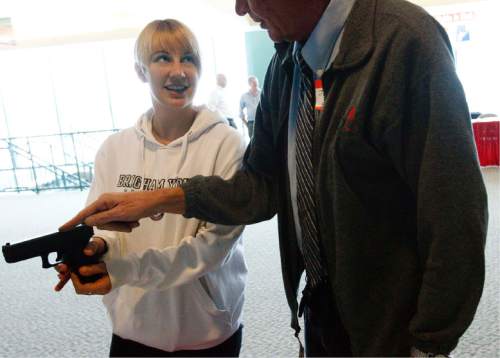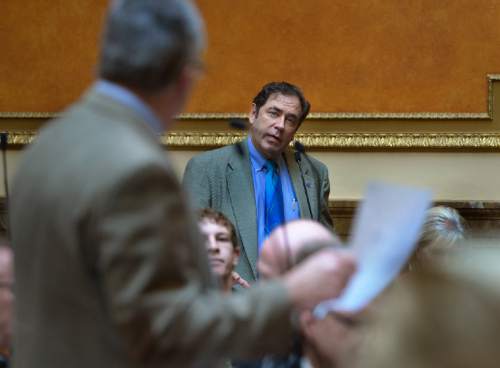This is an archived article that was published on sltrib.com in 2016, and information in the article may be outdated. It is provided only for personal research purposes and may not be reprinted.
In Utah, roughly 43 percent of all homicides are the result of domestic violence, and typically about 60 percent of those killings are committed with a firearm — statistics that have prompted state Rep. Brian King and others to look for ways to keep guns out of the hands of abusers.
King, D-Salt Lake City, is looking at a series of three bills seeking to tighten Utah's domestic-violence laws, including two specifically aimed at guns.
"I think there's a lot of common ground we can find if we work hard at it to move us forward incrementally," King said. "Will it result in universal background checks, trigger locks and all that? Not now, not in Utah. But will it result in moving in the direction of decreasing gun violence? I hope so."
One of the proposals King is considering seeks to put more teeth in a law that took effect last year, requiring individuals convicted of domestic violence to surrender their guns. Under his proposal, after a conviction an individual would be required to submit an itemized disclosure under court seal, detailing how each firearm was disposed of.
"It's basically making sure there's a tighter framework for ensuring that people who have these domestic-violence issues are reporting, that they're disclosing what weapons they have, that there are actions being taken to ensure those guns aren't in possession of the individuals dealing with those allegations," King said. "I hope that moves us in the direction of providing a little higher level of safety."
His second bill would add a disclosure requirement notifying potential gun buyers that it is a state and federal crime to attempt to purchase a firearm if they have been convicted of domestic violence. Prosecutors would be required to be notified of violations — which King believes would be easier to prosecute if the disclosure is made — and report on the outcomes of the cases.
Clark Aposhian, chairman of the Utah Shooting Sports Council, the state's leading gun-rights group, said he needs to see details of King's proposal, but generally speaking the group supports keeping guns out of the hands of domestic abusers.
"The Utah Shooting Sports Council and gun-owning community in general are not apologists for someone [having a gun] who is prohibited from owning a firearm or even attempting to purchase a firearm," Aposhian said. "We know that prohibited people, by and large, are the ones committing violent crimes, with or without firearms, and we would just as soon restrict their access."
The restriction on owning firearms is already in law, however, so it appears that, if there are problems with those people having weapons, it is an enforcement issue and not a statutory one. If it's shown the law needs to be beefed up, Aposhian said, he would be willing to consider the changes.
"What I'm trying to do is come up with some common-sense measures that move us forward and are politically feasible," King said. "This is such a difficult issue. It's hard for me to come up with ways that don't, as a knee-jerk reaction, cause gun-rights advocates to say, 'Not only screw you, screw you and the horse you rode in on.'"
King has two allies working with him on his proposals — Jeremy Roberts, who created the Gun Safety Council, and Boyd Matheson, president of The Sutherland Institute, a conservative think tank.
Roberts, who is a gun owner and advocate, said that last session the Legislature took on the leading cause of gun deaths when it began looking at the issues surrounding suicide. This year he hopes lawmakers will take reasonable steps based on the statistics to address domestic-violence homicides.
"If you're somebody who likes firearms, every time some criminal does something with a gun you're immediately put on the defensive," he said. "For too long, all we've done to Democrats and people who are concerned about guns is tell them to shut up, 'You don't know what you're talking about.' … Instead of telling them to be quiet, let's acknowledge their concern, but let's let the data tell us how to solve their concern."
Matheson said his group sees an opportunity to facilitate a discussion of the issue as part of its pro-family agenda.
"From a domestic-violence standpoint, for all the talk of dealing with gun violence, the vast majority of deaths, particularly here in Utah, is from suicides and the next one is domestic violence," Matheson said. "So that seems like a natural space to have a real meaningful conversation beyond 'Guns are bad and we need to deal with guns.'"
King is looking at two other changes dealing with domestic violence generally. The most sweeping would be to move domestic-violence cases out of justice courts and into district court. Currently, someone convicted of domestic violence in justice court can simply seek a new trial in the district court and King said that seems like a waste of time and resources.
All three of the bills are conceptual at this point as King works through the details with legislative researchers. If he moves ahead with the bills, they will be considered when the Legislature convenes in January.
Twitter: @RobertGehrke











